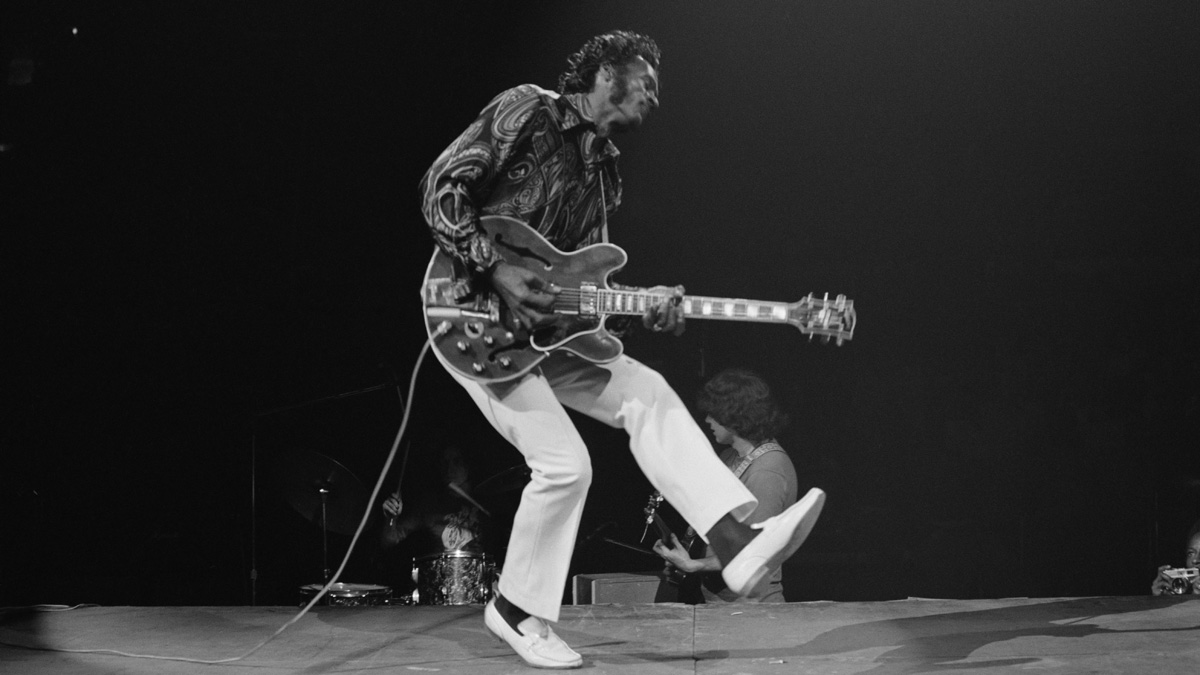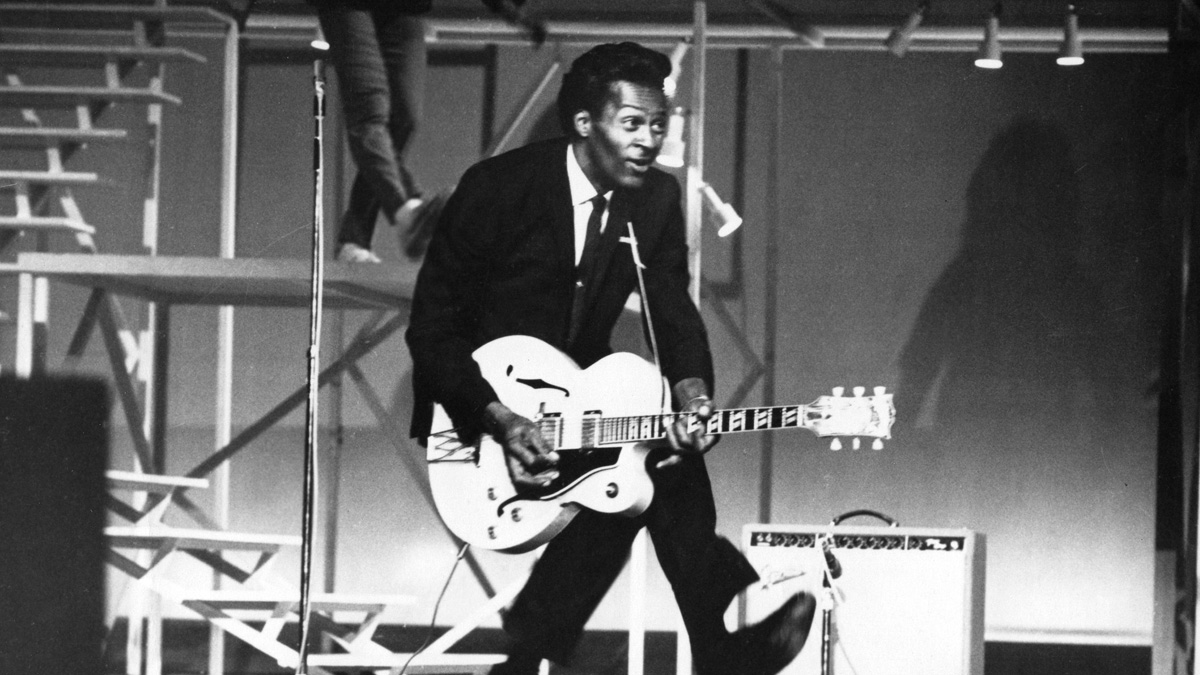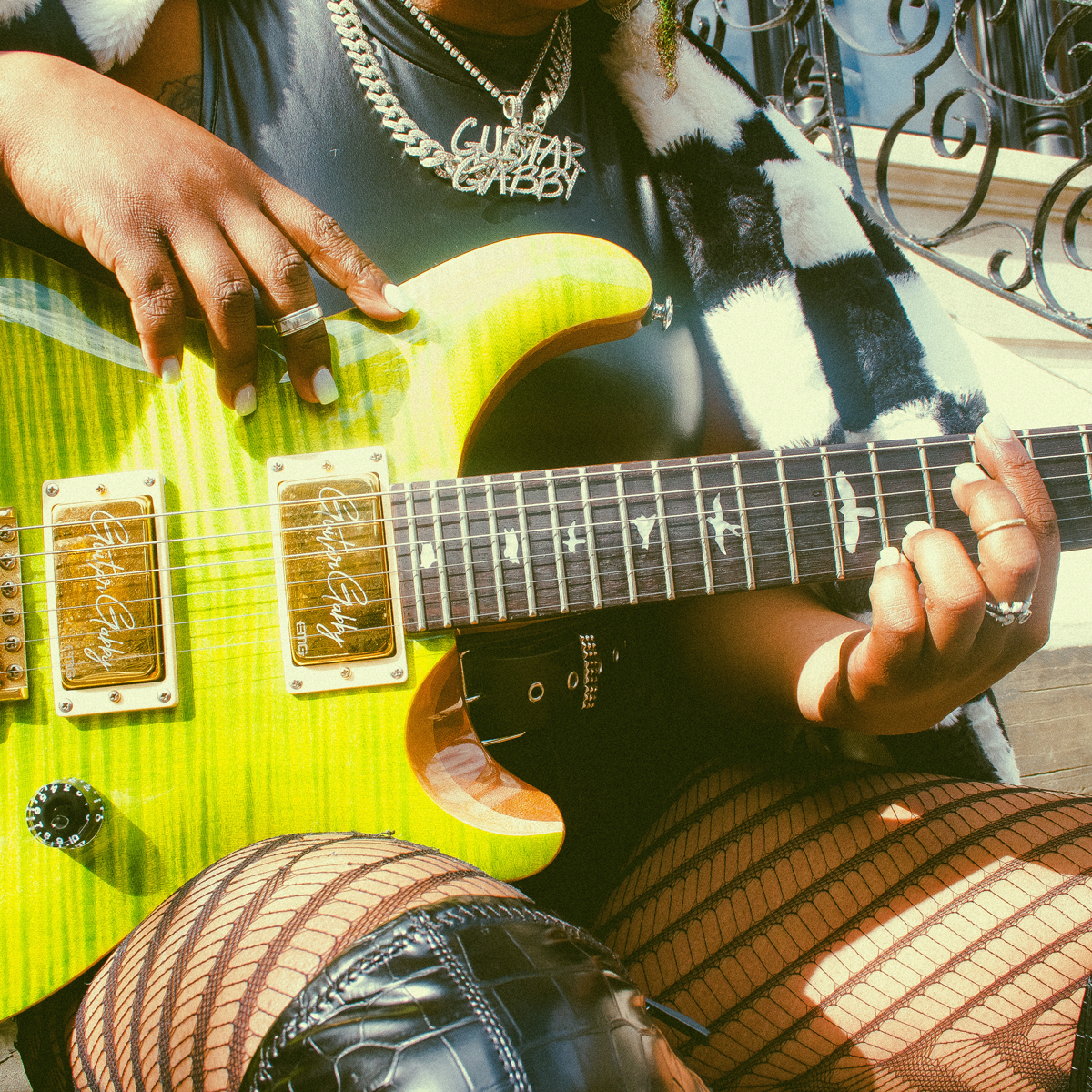How Chuck Berry shaped the sound of rock 'n' roll guitar
Dubbed the father of rock 'n' roll, Berry’s legacy has influenced whole generations of players – including Jackie Venson, who reflects on how her tone and style have been molded by the Gibson ES-350T-wielding icon

It’s May 1951, and Sixty Minute Man by Billy Ward and His Dominoes plays on the Moondog Show. The lyrics – “I rock 'em, roll 'em all night long” – were some of the first to use the words “rock” and “roll,” and would inspire American Disc Jockey Alan “Moondog” Freed to popularize the term on his 1950s radio show.
Freed, who often played R&B and rock records to bridge the gap between white and Black listeners, described the emerging rock 'n' roll style as a “river of music that has absorbed many streams” of music, all of which contributed to the “big beat.”
However, it wasn’t until Chuck Berry’s explosive distorted guitar on Maybellene arrived on the scene that the new style developed a lasting sound that would influence guitarists for decades to come.
Many often refer to Chuck Berry as the father of rock 'n' roll because of his ability to synthesize various genres of music into a sound that could appeal to both teens and adults alike. His fusion of jazz, country, blues and more was enjoyed by everyone, regardless of their race, while his licks and mastery of melody drew people from all walks of life, and contributed to what many see as the blueprint for rock 'n' roll that would last forever.
Charles Edward Anderson Berry (aka Chuck Berry) was born in 1926 in the segregated community of St. Louis, Missouri. His mother, Martha Bell Banks, was a public school principal, and his father, Henry William Berry, was a carpenter and deacon of Antioch Baptist Church. Berry was the fourth of six children and picked up his love for music from his mother, an accomplished pianist and singer.
This exposure to instruments at an early age was what gave way to his passion for music, which would lead him to perform while attending the first all-Black private high school west of the Mississippi – Summer High School. At the annual school talent show, he sang Jay McShann's Confessin' the Blues. The crowd gave him a reverberating applause that immediately piqued his interest for performance – an interest that would eventually lead to his infectious stage presence and signature “duck walk”, which he would introduce in a 1956 New York City show.
Berry picked up the guitar shortly after his riveting high school performance and began learning techniques from jazz guitarist Ira Harris. These lessons helped him define his distinctive rhythm guitar in hits like Rock and Roll Music and Roll Over Beethoven, which was later attributed to opening the door for the rock 'n' roll sound.
Get The Pick Newsletter
All the latest guitar news, interviews, lessons, reviews, deals and more, direct to your inbox!

Influenced by the guitar playing of T-Bone Walker (who played a Gibson ES-5), Berry modeled his sound to be gritty yet still retain clarity. One of his most iconic guitars was his Gibson ES-350T, which he played for most of his guitar parts in his Chess Records catalog.
During this period, Gibson was active in adapting to the changes in popular music. They produced instruments that gave guitarists such as Sister Rosetta Tharpe, B.B. King, T-Bone Walker and Chuck Berry the versatility they needed to continue cultivating the sound.
“You can hear the gritty-yet-clean guitar tone that Chuck Berry had in records such as Johnny B. Goode,” said Mat Koehler, Head of Development, Gibson Brands. “It was a humbucker-equipped sound that would set the benchmark for players who wanted to capture Berry’s fat, but elegant, tone.
“Berry’s tone was one that many guitarists wanted because of the focused intentionality in the overdrive," Koehler continued. "It had clarity like you would expect in country music, but it also had some weight behind it.”
His tone and skill are just two aspects of his legacy. His showmanship engaged crowds and seamlessly related to his audiences, young and old. The infamous “duck walk” was a move that T-Bone Walker began to do in the 1930s, and it heavily influenced Chuck Berry to incorporate these performance antics in his shows.
I was always impressed that Chuck Berry could play solos and dance at the same time. That inspired an everlasting effort in me to move during my own performances
Jackie Venson
“I was always impressed by the fact that he could play guitar solos and dance at the same time,” says Austin native and blues singer-songwriter Jackie Venson. “That inspired an everlasting effort in me to move and be more animated during my performance solos.”
Venson is the youngest of eight and, like Berry, was exposed to music at a young age, having played the piano for 13 years before picking up the guitar. “There was something about the pressure of music, college, and the desire to perform that made me realize I needed a change in my instrument selection if I were to continue pursuing music," she mused. "It was this gut feeling that led me to guitar.”

With influences like Chuck Berry, Buddy Guy, Jeff Beck, and Eric Gales, Venson has used her Gibson Les Paul Studio – affectionately named Rosetta – to cultivate her own sound that caters to the current generations of teens and adults.
“Right now, my current tone lies in the middle of a triad comprising my hands, my Gibson Les Paul and my Kemper profiling amp," Venson reveals. "My sound has become consistent and has allowed a space for me to flourish as myself in my own lane."
Growing up, her father was a professional bassist who also had his hand in many areas of the music business, including booking and management. Watching her father in action, Venson gained experience about how the industry operates and duly applied those skills to build her career.
Reflecting on the impact her father had, Venson mused, “Looking back on it today, I’m sure my dad influenced me in ways I don’t even realize. A big question I get is, 'Why guitar?' Watching my dad work as a professional bassist and being involved in many aspects of the business were two of my primary influences.
"But I am also deeply impacted by the depth of Chuck Berry’s influence, which manifested in the generations of artists that came after him.”
The essential role that Chuck Berry played in pioneering rock 'n' roll music and performance opened up the doors for exaggerated innovation on the stage. Inducted into the Rock & Roll Hall of Fame in 1986, Berry and his effervescent music continues to be played worldwide to this day.
Chuck Berry influenced every rock artist after him and every guitarist that ever plugged in
Greg Harris
“Chuck Berry is rock 'n' roll," said Greg Harris, President of the Rock & Roll Hall of Fame. "The undisputed original poet laureate, he influenced every rock artist after him and every guitarist that ever plugged in." Berry would go on to influence and unify music fans for decades to come, and that is what makes him a legend and a blueprint for the culture.
“I made records for people who would buy them," Berry famously said. "No color, no ethnic, no political – I don't want that, never did.”
Atlanta native Gabriella “Guitar Gabby” Logan is a Strategy Lawyer and proud Spelman College and Vermont Law School graduate. Her passion for perspective fueled her desire to establish TxLips Band, LLC., a global entity that triples as a TxLips Academy, TxLips Consulting Group, and an international female and gender-expansive rock collective. Logan believes it is vital for people to be well-rounded and strategic in creating careers based on passion and built off longevity. She is a contributing writer for Guitar World magazine, Governor of the Recording Academy Atlanta Chapter, and a Board Member of the Vermont Law School Alumni Association Board of Directors.
“It holds its own purely as a playable guitar. It’s really cool for the traveling musician – you can bring it on a flight and it fits beneath the seat”: Why Steve Stevens put his name to a foldable guitar
“Finely tuned instruments with effortless playability and one of the best vibratos there is”: PRS Standard 24 Satin and S2 Standard 24 Satin review












